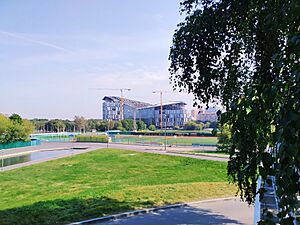Yandex facts for kids

Logo used since 2021
|
|

Headquarters in Moscow
|
|
|
Native name
|
Яндекс
|
|---|---|
| Privately held company | |
| Industry | |
| Founded |
|
| Founder |
|
| Headquarters | Moscow, Russia |
|
Area served
|
Worldwide |
|
Key people
|
Artyom Savinovsky (CEO) |
| Products | List of Yandex products and services |
| Owner | Alexander Chachava (25%) Pavel Prass (15%) Lukoil (15%) Alexander Ryazanov (10%) Senior management (35%) |
|
Number of employees
|
36,991 (2025) |
Yandex LLC (Russian: Яндекс, tr. Yandeks, IPA: [ˈjandəks]) is a Russian technology company that creates products and services for the Internet. Some of its popular services include a web browser, a search engine, cloud computing, and web mapping. It also offers online food ordering, streaming media, online shopping, and a service similar to Uber called a ridesharing company.
Yandex Search is the most used search engine in Russia. It holds about 72% of the search market in the country. Worldwide, its market share is about 2.8%. Yandex Taxi is also the biggest ride-sharing company in Russia.
Yandex was started by Arkady Volozh, and its first product, a search engine, was released in 1997. Because the company is a major media source in Russia, it has faced pressure from the Russian government. In July 2024, the company's Russian businesses were sold to a group of Russian investors for US$5.3 billion. This happened because of international rules and new laws about foreign ownership.
Contents
History of Yandex
How Yandex Started in the 1990s
In 1990, Arkady Volozh asked his high school friend, Ilya Segalovich, to help him create search tools for Russian text. They worked together at a company called Arcadia. In 1993, they came up with the name "Yandex," which stood for "Yet Another iNDEXer." The name is also a fun play on words, as "Я" (ya) means "I" in Russian.
On September 23, 1997, the Yandex.ru search engine was officially launched. A year later, Yandex started showing ads next to its search results. In 2000, Yandex became its own separate company.
Growth in the 2000s
In 2000, Volozh became the CEO of CompTek, a company that sold computer parts and software. That same year, an investment group bought a large part of Yandex for over $5 million. In 2001, Yandex launched Yandex.Direct, its own online advertising network.
By 2003, the company was making a profit. In 2005, Yandex opened an office in Ukraine and launched a Ukrainian website. It later created a special search engine just for Ukrainian users.
In 2008, Yandex created Yandex Labs in Silicon Valley to work on new search and advertising ideas. That same year, it bought SMILink, a company that monitored road traffic. This technology was added to Yandex Maps. Yandex also acquired the rights to Punto Switcher, a program that automatically switches the keyboard layout between Russian and English.
New Products and Growth in the 2010s
In 2010, Yandex launched an English-only search engine and Yandex Music, a music streaming service. The company also began investing in new tech startups.
On May 24, 2011, Yandex raised $1.3 billion by selling shares of its stock on the NASDAQ stock exchange. This was a huge event for an internet company. In 2011, Yandex also launched its services in Turkey.
In 2012, Yandex released its own web browser, based on Chromium. It also launched a mapping service for Europe and the U.S. By 2013, Yandex was the biggest media company in Russia based on how much money it made.
In 2014, Yandex opened a research office in Berlin, Germany. It also bought Auto.ru, a popular website for buying and selling cars, for $175 million.
In 2017, Yandex introduced its own smart assistant named Alisa, similar to Siri or Alexa. In 2018, the company launched Yandex Games, a platform for browser and mobile games. It also began testing its own self-driving cars in Moscow. That year, Yandex and Uber combined their ride-sharing businesses in Russia and several nearby countries.
In 2018, Yandex also released the Yandex.Station, its first smart speaker. In 2019, the Russian government required Yandex to change its company structure, which gave the government more influence over its decisions.
Recent Years in the 2020s
During the COVID-19 pandemic in 2020, Yandex offered free at-home testing services to people in some areas. In 2021, Yandex launched Yandex Pay, a service for making payments without cash.
In September 2021, Yandex's servers faced a massive cyberattack, the largest in the history of the Russian internet. In 2022, Yandex sold some of its services, like its news aggregator, to another Russian tech company, VK. In return, Yandex acquired the food delivery service Delivery Club.
In May 2023, Yandex launched YandexGPT, a smart program that can generate text, similar to ChatGPT. This technology was added to its virtual assistant, Alisa. In June 2023, Yandex began testing its first self-driving taxi service in Moscow.
In July 2024, the Dutch company that owned Yandex sold all of its Russian businesses to a group of Russian investors. This was a major change for the company.
Open Source Projects
Yandex has created many technologies that it shares with the public for free. This is called "open source."
- CatBoost: In 2017, Yandex released CatBoost, a powerful tool for machine learning. It helps computers learn from data. This technology is used by companies like CloudFlare to detect bots and by the European Organization for Nuclear Research (CERN) to study particle experiments.
- YDB: In 2022, Yandex published the code for its YDB database system. A database is a system for storing and organizing large amounts of information. YDB is used in many of Yandex's own services, like Yandex.Go and Yandex Market.
- YTsaurus: In 2023, Yandex shared the code for YTsaurus, a platform designed to work with "big data," which means extremely large sets of information.
Data Security Issues
Like many large tech companies, Yandex has faced security challenges.
Cyberattack in 2018
In late 2018, hackers attacked Yandex using special malware called Regin. The goal was to steal technical information about how the company protects user accounts. An investigation suggested that intelligence agencies from the Five Eyes alliance were behind the attack.
Email Accounts Compromised in 2021
In February 2021, Yandex announced that a system administrator had given outsiders access to nearly 5,000 user email accounts. The company apologized to the affected users.
Source Code Leak in 2023
On January 25, 2023, a large file containing 44 GB of Yandex's source code was leaked online. Source code is the set of instructions that tells a computer program how to work.
Statistics

See also
 In Spanish: Yandex para niños
In Spanish: Yandex para niños
- Comparison of webmail providers
- Runet
- VK (company)
- List of Yandex products and services
- Yandex Search
- YandexGPT
- Yandex Taxi




